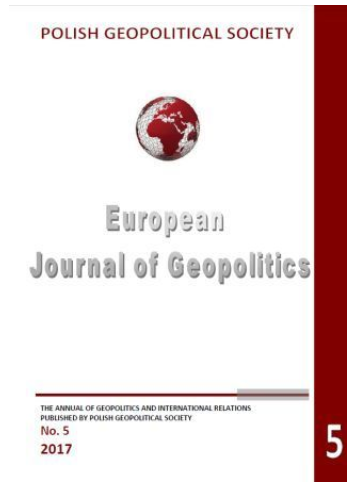THE IDEOLOGICAL BASE OF RADICALISATION OF YOUNG
MUSLIMS
THE IDEOLOGICAL BASE OF RADICALISATION OF YOUNG
MUSLIMS
Author(s): Aleksander GłogowskiSubject(s): Politics / Political Sciences, Social Sciences, Theology and Religion, Geopolitics
Published by: Polskie Towarzystwo Geopolityczne
Keywords: islam;salafism;fundamentalism;ideology;islamic state
Summary/Abstract: A radical Salafist ideology is attractive to people, especially young people, looking for simple solutions to solve the serious socioeconomic problems with which they cannot cope. Salafism is characterized by a Manichean division of the world on what is good, because it comes from God and what is bad. This in turn implies providing simple answers to complex questions. Actually, the simplest answer to the questions: why the people on Earth live badly? It is the statement "because mankind rejects the law of God revealed in the Qur'an and Sunnah." Therefore, the restoration of these foundations is the only one and the simplest way to solve all problems of mankind. The road to this seems to be simple: total war against "infidels and apostates". The Salafi mullahs as the custodians of “true Faith” have only right to decide who is “infidel of apostate”... Young people undergo indoctrination via the Internet, or in different "Islamic Centres" using freedom of religion (which is something fundamental for the West), are deprived of the ability to take a critical look at the content transmitted. Other are radicalized in prisons. Such circumstances stimulate reflection on the current life of their own, but also may lead to religious radicalism. The question arises: how much we still have to deal with religion as such or if it is a totalitarian political ideology? Of course, Salafism is the offshoot of Islam, but goes far than relations between men and Absolut. From the above reasons can be deduced its totalitarian character. Comparing the proposed by Zbigniew Brzezinski and Carl Friedrich definition of totalitarianism, we can substantiate such thesis. Guiding ideology is here Salafi interpretation of the Quran and Sunnah. Mass party is Salafi movement, which can take the form of a movement or the classic political parties such as the Muslim Brotherhood. The Islamic State tries to have a monopoly on weapons as much as possible, militarizing male part of the population. The Islamic State monopolizes the mass media, reaching new media as a means of attracting new adepts, and where the Salafists tend to power, contests existing media as "godless" encouraging the use of the Internet and underground publications. An example is the so-called Islamic State (the Daesh). It uses legitimate violence against any actual or alleged opponents of the ruling group, such as not only Christians, or Jews, but also people arbitrarily considered as non-Muslims. For this purpose, they create formations that can be called religious-moral police, and used traditional security institutions as well. Salafi vision of the World resembles a totalitarian concepts which Hannah Arendt writes about, as this interpretation of Islam vividly explains both past, present and forecast the future, and also presents a seemingly logical model of the state of God, which wants to put into practice. If we consider Salafi ideology as totalitarian, then we will need to apply the same methods to combat the Salafi preachers as those used to fight the followers of totalitarian regimes after World War II. Declarations of similar firmness in the fight against "Jihadism" appear at various levels of government of countries such as Germany for many years. However, there is lack of sufficient firmness and consistency in their effectiveness.
Journal: European Journal of Geopolitics
- Issue Year: 2017
- Issue No: 5
- Page Range: 4-21
- Page Count: 18
- Language: English

